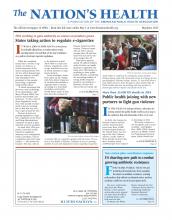Mexican-American seniors in the U.S. are spending a significant part of their twilight years living with disabilities, according to a recent study.
The findings come from research published online in November in The Journals of Gerontology, Series B: Psychological and Social Sciences, and that is expected to be published in an upcoming print issue.
The study analyzed the health and functioning of more than 3,900 people in America who are of Mexican origin over 17 years in the Hispanic Established Populations for Epidemiologic Studies of the Elderly.
Researchers were interested in the health of Mexican-Americans because many are foreign-born and also lack access to health insurance, said Ronald Angel, PhD, a study author and professor at the University of Texas at Austin’s Department of Sociology.
“I think, unfortunately, we’re finding out that although we can postpone death in many cases and make it possible for one to live with diabetes or heart problems longer, we have less success of postponing in the onset of the conditions itself,” Angel told The Nation’s Health. “We’re living longer but the price is living longer with what are occasionally very serious impairments. And of course that’s very important because dependency will be a big problem for families and for society at large.”
The study measured participants on balance, standing and sitting down in a chair and walking at a normal pace for 8 feet. They were also screened for depression, tested on their memory and reasoning skills and asked about any past alcohol use or smoking history, among other questions.
Over 17 years, the study found that 37.5 percent of participants who initially functioned at a moderate level eventually developed a disability and 14.5 percent had a disability initially and continued to over the study period. Forty-eight percent of participants who initially had a high level of functioning experienced a decline in functioning but did not develop a disability, the study said.
The study also found that foreign-born women, older adults and people who reported having trouble with finances were more likely to have a disability.
Changes in the work environment, such as more women in the workplace instead of at home caring for seniors, means new policies are needed to help Mexican-Americans support their families.
“This population tends not to go to nursing homes or long-term care facilities,” Angel said. “They prefer to stay in the community as long as possible. What public health is focused on is optimizing health as long as possible. Government can’t do it alone, nor can families. We need public health initiatives that support families in their role as caregivers, in addition to trying to postpone diabetes and get the best possible compliance with people taking blood pressure medication. Basically, what we need is an aggressive public health approach.”
For more information, visit http://psychsocgerontology.oxfordjournals.org/content/early/2014/11/19/geronb.gbu158.abstract.
- Copyright The Nation’s Health, American Public Health Association









